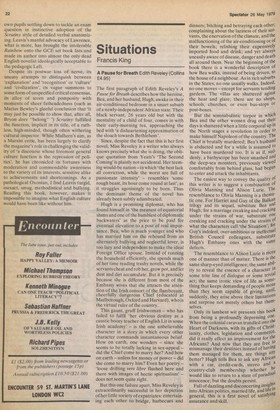Situations
Francis King
A Pause for Breath Edith Reveley (Collins 24.95) The first paragraph of Edith Reveley's A Pause for Breath describes how the heroine, Bea, and her husband, Hugh, awake in their air-conditioned bedroom in a smart suburb of a newly-independent African state. Their black servant, 26 years old but with the mentality of a child of four, comes in with their early-morning tea, approaching the bed with `a disheartening approximation of the slouch towards Bethlehem'.
Since, despite the fact that this is her first novel, Miss Reveley is a writer who always knows precisely what she is doing, the oblique quotation from Yeats's 'The Second Coming' is plainly not accidental. Her teeming would-be nation —in which 'the best lack all conviction, while the worst are full of passionate intensity' — resembles 'some rough beast, its hour come round at last', as it struggles agonisingly to be born. Thus the dominant theme of the novel has already been subtly adumbrated.
Hugh is a promising diplomat, who has found himself in 'the meanest of equatorial slums and one of the humblest of diplomatic backwaters' as the price to be paid for eventual elevation to a post of real importance. Bea, who is much younger and who has married him on the rebound from an alternately bullying and neglectful lover, is too lazy and independent to make the ideal Foreign Office spouse. Instead of running the household efficiently, she spends much of her time reading trashy novels, while the servants cheat and rob her, grow pot, and let dust and dirt accumulate. But it is precisely because she is different from most of the Embassy wives that she attracts the attention of the Irish consort of the flamboyant, cheerfully dangerous Chief (educated at Marlborough, Oxford and Harvard), who is the virtual ruler of the country.
This gaunt, gruff Irishwoman — who has failed to fulfil `her obvious destiny as a caustic boozy teacher of English Lit in some Irish academy' — is the one unbelievable character in a story in which every other character commands instantaneous belief. How on earth, one wonders — since she seems to be totally lacking in sex-appeal — did the Chief come to marry her? And how on earth — unless for money or power — did she come to marry him? Even her poetry — 'loose drifting vers libre flushed here and there with images of hectic spiritualism' — does not seem quite right.
But this one failure apart, Miss Reveley is extraordinarily successful in her depiction of her little society of expatriates: entertaining each other to bridge, barbecues and dinners; bitching and betraying each other; complaining about the laziness of their servants, the enervation of the climate, and the malfunctioning of the air-conditioning or of their bowels; relishing their expensively imported food and drink; and yet always uneasily aware of disease, danger and death all around them. Near the beginning of the book there is a wonderful description of how Bea walks, instead of being driven, to the house of a neighbour. As in rich suburbs in the States, no one usually walks. Indeed, no one moves — except for servants tending gardens. The villas are shuttered aginst the heat and glare; there are no shops, schools, churches, or even bus-stops or post-boxes.
But the somnabulistic torpor in which Bea and the other women drag out their days is shattered when a little corporal up in the North stages a revolution in order to make himself Napoleon of the country. The Chief is brutally murdered; Bea's husband is abducted and for a while is assumed to have been murdered too. It is as if, suddenly, a bathyscope has been smashed and the deep-sea monsters, previously viewed comfortably from behind glass, had begun to enter and attack the inhabitants.
The easiest way to convey the quality of this writer is to suggest a combination of Olivia Manning and Alison Lurie. The resemblance to Olivia Manning is a thematic one. For Harriet and Guy of the Balkan trilogy and its sequel, substitute Bea and Hugh; for a marriage creaking and cracking under the strains of war, substitute one creaking and cracking under the strains of what the characters call 'the Situation'; for Guy's indolent, over-ambitious or ineffectual British Council colleagues, substitute Hugh's Embassy ones with the saute defects.
The resemblance to Alison Lurie is more one of manner than of matter. There is the same sharp-eyed intelligence; the same ability to reveal the essence of a character .111 some trite line of dialogue or some trivial act; the same ironic view of life as something that keeps demanding of people mot! than they seem capable of giving, until, suddenly, they arise above their limitations and surprise not merely others but themselves. Only its lambent wit prevents this book from being a profoundly depressing one' When the colonial caravan trundled into the Heart of Darkness, with its gifts of Christianity, clothes, legislation and commerce' did it really effect an improvement for the Africans? And now that they are free.° mismanage their destinies instead of having them managed for them, are things .anY better? Hugh tells Bea to ask any African with a car, credit-cards, stereo and a country-club membership whether would like to return to a state of paradisa' innocence; but the doubts persist. Full of dazzling and disconcerting insights into African politics, married life, and life. in general, this is a first novel of satisfrng assurance and skill.


































 Previous page
Previous page